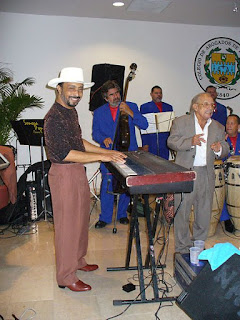Papo Lucca: Montunos

We interrupt your regularly scheduled programming for a guest post! Enjoy pianist Malcolm Campbell on Papo Lucca's approach to montuno playing . Papo Lucca, smiling Puerto Rican pianist Papo Lucca is one of the great salsa pianists of all time. His father Quique Lucca started the band Sonora Ponceña in 1954, and Papo has directed it for the past 40 years or so. I transcribed five of his montunos from Explorando, one of my favorite Sonora Ponceña albums, from 1978. Papo Lucca was 32 at the time. More so than in jazz, the pianist in salsa music is central to the rhythmic drive of the band. Since the percussion is spread out over a whole section of people, the pianist is much more akin to a jazz drummer in terms of the personal responsibility he has for the groove. On top of this, he is also the primary (sometimes the only) chordal instrument. Papo basically has three modes of playing on this album: arranged hits, montuno, and ad lib comping/soloing.

.png)
.jpeg)
